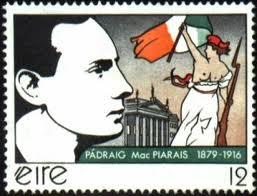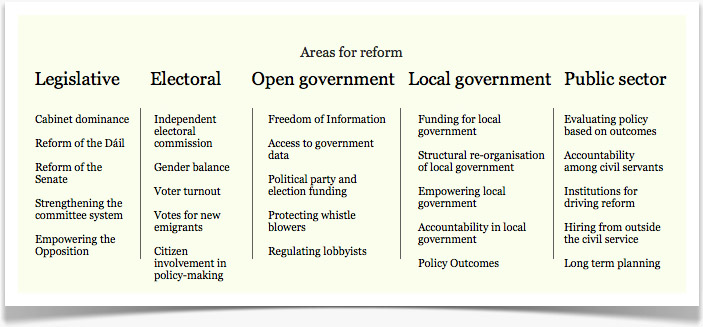Ranking promises of political reform

Blogger Suzy Byrne said on RTE's Frontline Monday night that 'reform' is one of the most abused words of the election campaign. And indeed, the idea of political reform has been co-opted by every party and Independent in this campaign. How much of the rhetoric is genuine and what will work? Reformcard.com seeks to answer this by scoring political parties on their policies. Philip Connolly speaks to co-creator Joseph Curtin and academic Gary Murphy about the project.
'Pure frustration' spawned reform.card com, according to Joseph Curtin, one of its creators. "It came out of frustration with the seeming cycle of crisis that we have had in this country. We wanted to see if we could do something to play our part in driving change."
The website aims to evaluate the political reforms being proposed by our political parties, and to the monitor the implementation of these. Its progenitors are Curtin and Johnny Ryan, both researchers with the Institute of International and European Affairs.
"A few months ago everyone was focusing on abolishing the Seanad," said Curtin, "as if that was something that would be a groundbreaking transformation of our political system. It seemed to me that it was just being held hostage to fortune, and that there was no real focus on the kind of fundamental reform that it seemed was required in our system to prevent us arriving here again in 2040."
The political reform Scorecard is a tool designed with independent experts to rate the quality of political parties' commitment to reform. It will assess promises before the election, and track implementation of reform measures thereafter. Each party's manifesto was rated in five key areas: legislative; electoral; open government; local government; and public sector (the academic panel's explanatory memorandum is available here.)
According to Ryan, "the original idea was that we would do a framework to focus on what we thought were the five key areas of political reform. We circulated that to all of the political parties to say that we are going to be ranking your manifestos, you're going to be compared to each other on the basis of these five key areas and we are going to be making it very public."
"The idea was that firstly we would have this top-down influence on politicians, and then the bottom up part was to provide, in a very simple and clear way, a ranking for somebody who is too busy to read all the manifestos. We thought of the idea of literally marking them all out of 100."
The Scorecard Table is made up of the five key areas, each of which contains five indicators. The 25 indicators are scored on a scale of 0-4 (see link at end of article). Parties will be scored out of 20 in each area, and 100 overall.
Last Wednesday, after the website's academic panel reviewed all the manifestos, the reformcard scores went up. Fine Gael came out top, scoring 72.9 out of 100. Labour scored 67.6, with Fianna Fáil and the Green Party at 57.1 and 52.5 respectively. Sinn Fein were ranked considerably lower than the other parliamentary parties with a score of 26.3. The chief criterion was commitment to reform.
"From our side what we are interested in doing is to look at issues of political reform, see what is in the manifestos and, as a long term project, to see if these promises have been followed through," said Professor Gary Murphy of Dublin City University. He's a member of reformcard.com's academic panel and current president of the Political Studies Association of Ireland.
"One of the issues we face in Irish politics is that people have become cynical and distrustful of politicians on the very grounds of what appears in election campaigns, in manifestoes, and even programmes for government, that doesn't get implemented"
"This just breeds even more cynicism. What we are trying to do on the academic panel is to look at it in a dispassionate, non-political way, and to try our best to score the manifestoes. We [the academic panel] do it individually so no one can see anyone else's scores. There is no bias involved."
The project does not end after the election. A second stage will begin after the Programme for Government has been announced, when reformcard.com will begin tracking implementation of reform promises.
"To be frank I view it as a public service,", said Murphy. "The work of an academic is more than simply lecturing, that's why I am involved."
Is the internet changing the role of the academic within Ireland's national debate? "I think it is; we couldn't have done this 10 years ago. The great thing about the internet for us is the access it gives the wider public. In previous elections no one would have cared about this, it would be seen as a bunch of nerdy academics. But I think the reality is the internet has been a boon."
"We are able to use our expertise for public consumption and benefit. If you published this in a research paper no one would see it; what we are trying to do is make these things as public as possible."
Image from: http://1169andcounting.blogspot.com

